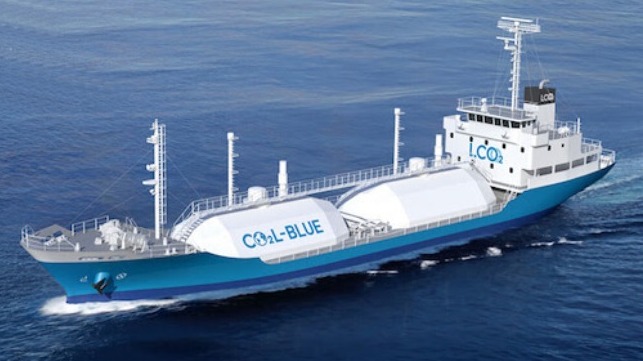Japan to Build World’s First Liquified CO2 Carrier to Demonstrate CCS

Mitsubishi Shipbuilding Co. is going to build the world’s first ship that they say is specifically designed for the emerging carbon capture and storage initiatives. Although ships have been built in Europe and Japan to carry LCO2 used in the food industry, the partners to this project believe it will serve to aid technology development and the demonstration to realize high-volume CO2 transport.
Japan’s national research and development agency, New Energy and Industrial Technology Development Organization (NEDO) is leading a series of efforts designed to encourage the research and development into aspects of the emerging CO2 value chain. Among these projects is research into marine transportation of CO2 as well as large-scale storage. The demonstration ship is designed in conjunction with these initiatives.
Mitsubishi Shipbuilding will be in charge of all aspects from the ship design through construction, including the cargo containment system, applying its gas handling technologies and expertise cultivated through the construction of liquefied gas carriers both for LPG and LNG. The demonstration ship is projected to be 236 feet long with a tank capacity of 1,450 m³.

that matters most
Get the latest maritime news delivered to your inbox daily.
Construction for the new vessel will get underway at the Enoura Plant of MHI’s Shimonoseki Shipyard & Machinery Works. Completion and delivery are scheduled for the second half of fiscal 2023. Once completed, the ship will be owned by Sanyu Kisen Co., which will in turn charter the ship to the Engineering Advancement Association of Japan (ENAA), which will oversee the demonstration projects. “K” Line, Nippon Gas Line Co., and Ochanomizu University will also participate in the R&D of the LCO2 transportation technology.
Mitsubishi has been seeking to develop a leadership role in CO2 transportation building on its experience developing some of the first liquified gas carriers more than 50 years ago. In addition to this project, the shipbuilder has research efforts underway with Total Energies, Mitsui O.S.K., and NYK, all focusing on the development of CO2 carriers. Mitsubishi also participated in the first successful demonstration program to capture CO2 from an operating ship, building the system and working with partners including “K” Line. According to Mitsubishi, through the experience to be gained by constructing the world’s first LCO2 carrier built specifically for CCUS, MHI Group’s goal is to strengthen its current strategic business focused on energy transition.
